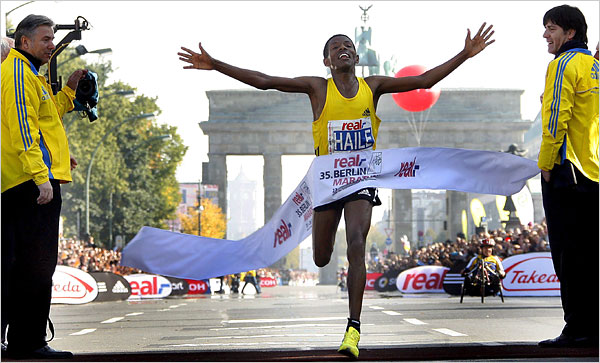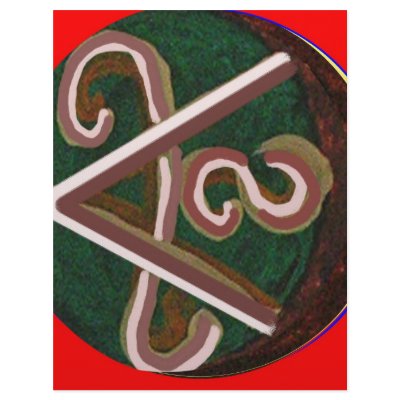

|
Science offers the boldest metaphysics of the age. It is a thoroughly human construct, driven by the faith that if we dream, press to discover, explain, and dream again, thereby plunging repeatedly into new terrain, the world will somehow come clearer and we will grasp the true strangeness of the universe. And the strangeness will all prove to be connected, and make sense. — E. O. Wilson |
1 September 2012
|
||
|
1 + 1 = _ I was at a wedding today, where the presiding Rabbi told the couple, “Now you have three lives: There is Ben’s life and Erica’s life, and your life as a couple is a third life.” Maybe the Rabbi had studied quantum mechanics. The quantum world is exponentially richer than the classical world it supplanted in the conceptual framework of science. In fact, its richness challenges our imaginations. By “richness” I actually mean something quantifiable. Information is a physical quantity, understood as such since the work of Ludwig Boltzmann in the 19th Century, and related to what is called “information” in computation by Claude Shannon in the mid-20th Century. In classical physics, it takes 3 numbers to tell where a particle is in space, and 6 numbers define the positions of two particles. Two particles have twice as much information as one particle. How could it be otherwise? In quantum mechanics – defying all our intuition – the information goes up exponentially with the number of particles. Three particles carry 8 times as much information as one, and four particles carry 16 times the information. Because of this, quantum computers are enormously more powerful than classical computers. An ordinary computer with 128 bits of memory can’t do hardly nothing. But a quantum computer with 128 qubits is one powerful mother of a computer. Twenty years ago, quantum computers were an idea. No one was sure whether one could ever be built, or, if so, whether it would be of practical use. But today you can buy one (if you have $10 million). Building the hardware (and cooling it with liquid He) has proved to be the easier part. The challenge for the future is to figure out how to program them to do useful things. So far, computer theorists have figured out how to solve exactly 3 problems with quantum computer programming, and one of those 3 is actually quite useful. — Josh Mitteldorf |
2 September 2012
|
||
|
Wisecracks There is an infinite amount of hope in the Universe...but not for us. Be yourself. Everyone else is already taken.
Work is of two kinds: first, altering the position of matter at or near the earth’s surface relative to other matter; second, telling other people to do so. |
3 September 2012 |
||
|
Milhaud Darius Milhaud was in the business of making serious music out of jazz harmony. His sound and spirit are very French, and he moved to California only when France became Nazified in 1939. There are 427 opus numbers, stretching from 1910 to 1968. His 14th and 15th String Quartets are made so they can be played simultaneously as an Octet. Listen to the 3rd movement, Ile de France, from the Suite Francaise by Darius Milhaud, born this day in 1892 |
4 September 2012
|
||
|
Almost English
Hint: Claith is cloth. He’s satirizing well-dressed phonies. -jjm |
5 September 2012
|
||
|
Jane Addams When the World War broke out in Europe, Jane Addams wrote to Woodrow Wilson: At this crisis of the world, to establish a ‘citizen soldiery’ and enormously to increase our fighting equipment would inevitably make all other nations fear instead of trust us...It has been the proud hope of American citizens who love their kind, a hope nobly expressed in some of your own messages, that to the United States might be granted the unique privilege not only of helping the war-worn world to a lasting peace, but of aiding toward a gradual and proportional lessening of that vast burden of armament which has crushed to poverty the people of the old world. Jane Addams was born this day in 1860 |
6 September 2012
|
||
|
Junk DNA? Think again In what many scientists say is a revolution in biology, a giant new project is rewriting our understanding not only of what causes diseases or what makes our eyes a certain color, but what makes us human. And it turns out scientists have been looking in the wrong place for a very long time. The bounty of new discoveries, released in a batch of 40 research papers on Wednesday, shows the stretches of DNA that we call genes are only a very small piece of what makes the body work. Much more important is the stuff in between the genes – stuff once dismissed as “junk DNA”. It turns out that junk DNA is what is in control, they report in the series of papers in the journals Nature, Science and elsewhere. |
7 September 2012
|
||
|
Dvořák So much great music...A personal favorite for me is the Seventh Symphony. The 3rd movement (beginning 21:30) is a delightful, melodic dance. The 2nd movement (beginning 10:50) moves from peace to triumph and back again. Antonin Dvořák was born this day in 1841 |
8 September 2012
|
||
|
Adding up happiness points Looking up at the tumbling puffs of white on blue, caressed by the waters of the lake, I thought of collecting this joy and adding it to my accumulated moments of pleasure. You only live once, so enjoy it while you've got it. This bit of wisdom is ubiquitous, and it is also profoundly wrong. Life is not a consolation for death. It is what we are. It is all that we are. Finding our authentic selves within a cooperative community and creating true and wholesome lives is a more satisfying and fulfilling plan than collecting joyous memories or amassing happiness points. — Josh Mitteldorf |
9 September 2012
|
||
|
Fortune cookie “Good ideas will spring forth naturally from your mind in the coming weeks.” |
10 September 2012
|
||
|
“by desiring what is perfectly good, even when we don’t quite know what it is and cannot do what we would, we are part of the divine power against evil—widening the skirts of light and making the struggle with darkness narrower.” — George Eliot (Middlemarch) |
11 September 2012
|
||
|
Redirected effort How much freer and happier we would feel, and how much more powerful we would be, if only we stopped struggling against the grain of our natural gifts and inclinations, stopped trying to be what we are not, and instead used willpower to stay true to an exciting and joyful life purpose. — from The Yoga of Eating, by Charles Eisenstein In a divided self, willpower is a puny thing. |
12 September 2012
|
||
|
Max Tegmark thinks big Tegmark is a physicist at MIT specializing in cosmology. Listen to his presentation at the Singularity Summit in New York last year. He argues that are the only intelligent civilization in our galaxy, based on his judgment that from where we are, it’s not a very great leap to create self-replicating machines and propulsion systems capable of exploring the entire galaxy in a matter of millions of years. It advanced civilizations were common, then someone would be a few million years ahead of us, and would have already done this, and we’d have seen the consequences from where we are. If humanity is the unique self-aware life from in the galaxy then it is likely that we are alone in the entirety of the visible universe. It may be that humans are important after all, and more than this that we are at what he calls a fork in the road, a crucial time in the developmental history of our race when we might either destroy ourselves or take the next step toward securing our collective future and laying the foundations for a new kind of self-directed evolution. |
13 September 2012
|
||
|
Being Alone Never on one single pore Eternity or felt your shy mouth tremble, like the white wave. I have not felt with hunger or your silver hands whatever flower of your house locked to its breast. harmlessly under the bellies of sharks, drift inconspicuously like a leaf, a bubble of carion, From Lies , by CK Williams |
14 September 2012
|
||
|
Late Summer Sensommar Så blir det lördagskväll igen och bastun eldas Kväll - och snart natt —Gunnar Ekelöf, born this day in 1907 Late Summer So it will be Saturday night again and the sauna fired Evening - and soon night —translation by Google, with a lilttle help from JJM |
15 September 2012
|
||
|
Striving re-defined Having high standards for yourself can mean “trying” harder, driving yourself so hard that your performance actually is dragged down in the long run by your physical and mental state. Or it can mean having such high regard for yourself, such faith in yourself that you pamper yourself, get the rest and the exercise and the love and the diet you need to thrive and to perform at your best in the long run. — Josh Mitteldorf |
16 September 2012
|
||
|
Words that cannot be spoken, ideas that cannot be thought The Kabbalists explain that the sounds of the shofar transcend all verbal expression. Human speech is constrained by the limitations of a person’s ability to enunciate words, to find expressive words in his vocabulary, to arrange his words in a form that will accurately reflect and articulate his thoughts. But some thoughts and feelings are too exalted to find expression through such limited means. The yearning of the Jewish soul to come close to G-d, to cleave to the Divine, is so intensely spiritual that mere human speech is inadequate to give it expression. The sound of the shofar, however, connects with this inner yearning and gives it expression. It is the sound of the immortal soul crying out to its Creator in an ecstasy of love, devotion and yearning. It is the sound that breaks the barriers of mere words and embraces myriad spiritual expressions - from the most abject remorse to the most intense joy. And what of the truths that can be neither spoken nor conceived? |
17 September 2012
|
||
|
Thrice happy she! that is so well assured |
18 September 2012
|
||
|
Those who cannot forgive others break the bridge over which they themselves must pass. —Confucius (c. 551-478 BCE) |
19 September 2012
|
||
|
Nothing Twice Nothing can ever happen twice.
Even if there is no one dumber,
No day copies yesterday,
One day, perhaps some idle tongue
The next day, though you’re here with me,
Why do we treat the fleeting day
With smiles and kisses, we prefer — Wislawa Szymborska, from Poems New and Collected 1957-1997 |
20 September 2012
|
||
|
Happy International Peace Day Peace comes from being able to contribute the best that we have, and all that we are, toward creating a world that supports everyone. It is also securing the space for others to contibute the best that they have and all that they are. |
21 September 2012
|
||
|
The best reason The best reason to culture detachment from our thoughts and expectations is that the future is going to be far more wondrous and miraculous than anything we can imagine. — Josh Mitteldorf |
23 September 2012
|



















